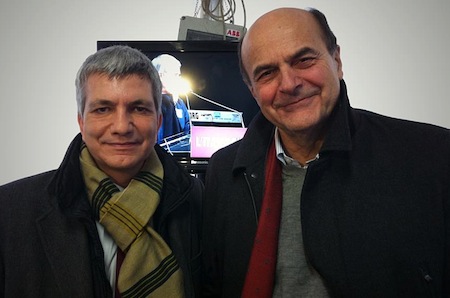In the last days of Italy’s election campaign, it’s become somewhat conventional wisdom that although the broad centrosinistra (center-left) coalition headed by prime ministerial candidate Pier Luigi Bersani is still on target to win control of Italy’s lower house of parliament, the Camera dei Deputati (House of Deputies), it’s now a toss-up as to whether Bersani’s coalition will win enough of the 315 seats up for election to the upper house, the Senato (Senate), to form a stable government.![]()
The reason is based on some odd quirks of Italian electoral and constitutional law — the key point is that while elections to both the Camera dei Deputati and the Senato are conducted according to proportional representation, seats are awarded differently between the two. The party or coalition that wins the largest proportion of the vote nationally will be guaranteed at least 54% of the seats in the Camera dei Deputati, but seats are awarded to the Senato only on a regional basis, so that the largest vote-winner in each of Italy’s 20 regions is guaranteed a majority of the region’s seats. Given that Lombardy, Campania and Sicily, three of Italy’s four largest regions, are essentially tossups, the centrodestra could win those three regions and deny Bersani a senatorial majority.
For Bersani to control the lower house, but not the upper house, of Italy’s parliament is certainly somewhat of a nightmare for a campaign that led by double digits when the campaign began.
Thus the hand-wringing that Bersani will be forced to assemble a governing coalition that includes not only his electoral partner, the socialist Sinistra Ecologia Libertà (SEL, Left Ecology Freedom), the party of the two-term regional president of Puglia, Nichi Vendola (pictured above, left, with Bersani, right), but also turn to other partners — practically, this means some sort of alliance, in the upper house at least, with the centrist coalition led by prime minister Mario Monti, Con Monti per l’Italia (with Monti for Italy).
If the senatorial balance were, however, incredibly close (say, one to three seats), Bersani might also turn to a tiny number of senators likely to be elected from the predominantly communist Rivoluzione Civile (Civil Revolution) coalition, though it remains to be seen whether they would back Bersani — Vendola would certainly find more common cause with them than with Monti and his allies.
Monti and Vendola have mutually ruled out serving together in the same coalition — although Bersani has already committed to many of the reforms that Monti began, Vendola has been much more critical of the Monti government’s efforts, whcih have included tax increases and tax and labor reform.
It doesn’t help that Vendola, who is openly gay and supports same-sex marriage in Italy, is at contretemps with the social conservative bent of Monti’s coalition. Although Monti has expressly opposed same-sex marriage and adopt by same-sex couples, the coalition includes the Unione di Centro (UdC, Union of the Centre), comprised of former Christian Democrats and led by Pier Ferdinando Casini, who has very close ties to the Vatican, and Futuro e Libertà per l’Italia (FLI, Future and Freedom), a party formed by Gianfranco Fini, a moderate who once served as Silvio Berlusconi’s foreign minister.
There are no easy answers for Bersani, and on Monday, Wolfgang Münchau at The Financial Times predicted a re-run of the prior leftist government of former prime minister Romano Prodi, who came to office in April 2006 as the moderate head of a wide-ranging leftist coalition that included relatively moderate former Christian Democrats, more progressive social democrats and die-hard communists (including Fausto Bertinotti, who became the president of the Camera dei Deputati from 2006 to 2008).
That government fell in early 2008 over a vote of no confidence in the Senato, when senator-for-life and former Christian Democratic prime minister Giulio Andreotti scuttled an attempt to pass equal civil rights for same-sex partners.
So Münchau is right to predict that the chances of a full five-year — or even one-year — government are fairly slim in the event of an unwieldy coalition that would include not only Vendola and Bersani (difficult enough), but also Casini, Fini and Monti.
That will certainly cause even more hand-wringing and not just in Milan and Rome, but in Berlin, Brussels, London and Washington, too — without a stable government to assure investors, a new Italian financial crisis could once again endanger the future viability of the single currency. That’s assuming that Italy, and the other troubled economies of the eurozone, finds a path out from the wilderness of increasing unemployment and low or declining GDP growth. The reality is that the next government, whether led by Monti, Berlusconi or Bersani, will face a lot of incredibly difficult and painful choices for Italy’s future.
But the troubling precedents go beyond the most recent Prodi government — the Italian left has been long fragmented and disorganized since the end of the ‘first republic’ and the breakup of the former Partito Comunista Italiano (PCI, Italian Communist Party), which goes a long way in explaining how dysfunctional leftist governments have been in Italy. Continue reading History shows Italy’s likely center-left coalition will likely be short-lived and tenuous
